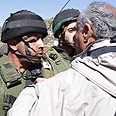
Bethlehem protest
צילום: אוהד צויגנברג
Palestinians demanding prisoners' release riot in West Bank
Palestinians across West Bank protest for prisoners held in Israel, clash with IDF, demand release of four detainees on hunger strike
Palestinians blocked roads and held marches across the West Bank on Monday to protest the fate of thousands of prisoners held in Israeli jails and demand the release of four detainees on hunger strike.
The hunger strikers include Samer Issawi, 35, whose health has severely deteriorated after staging an on-again, off-again strike for more than 200 days. The men were all in stable condition, said a spokeswoman for Israel's Prison Authority, Sivan Weizman.
Related stories:
- Palestinian prisoner in isolation struggles to recall language
- Palestinian protest for hunger strikers turns violent
- EU calls for better conditions for Palestinians prisoners
Israel is holding some 4,500 Palestinians for charges ranging from throwing stones to undertaking deadly terrorist attacks.
Hundreds of men and women in the southern town of Hebron brandished yellow, red, black-and-white flags of different Palestinian factions. Other demonstrators held up photographs of their loved ones behind
bars, some in heavily ornate frames.
"Freedom for the prisoners!" they chanted.
Near the biblical city of Bethlehem, Israeli forces chased protesters who blocked a major West Bank road. Soldiers chased them with sticks and hurled tear gas and stun grenades between jammed cars as Palestinians blocked traffic, waving their national black-green-red-and-white flag and shouting support for the prisoners.
There were no reports of injuries. A military spokeswoman said forces responded after Palestinians hurled rocks at soldiers.
In the West Bank city of Ramallah, about 50 people demonstrated at a UN office. Another demonstration was staged in the northern city of Nablus.
Of the four hunger striking prisoners, Issawi has refused food for the large part of some 200 days. He was hospitalized over the weekend after he lost consciousness, but his condition improved after receiving an
IV drip containing vitamins and minerals, a lawyer for the men, Jawad Boulous said.
Another prisoner, Ayman Sharawneh, refused food for 70 days. He halted his strike for a month and resumed it two weeks ago, said prison spokeswoman Weizman. The other two men have refused food since they were incarcerated almost three months ago, she said.
Issawi and Sharawneh were prisoners who were freed as part of a 2011 exchange that released hundreds of Palestinians, many of them terrorists involved in deadly attacks, in exchange for Gilad Shalit, an Israeli soldier held by Hamas-backed terrorists.
Issawi's original sentence was 26 years for a terrorist act but he had served only six years, Weizman said.
The four were re-arrested and sent to prison for violating the terms of their release, Weizman said. She said Issawi was banned from entering the West Bank but entered three times after he was freed.
He was arrested in July, said Anat Litvin from Physicians for Human Rights-Israel. The Israeli rights group monitors Palestinian prisoners.
Litvin said neither Issawi nor Sharawneh, who was arrested in January 2012, has been sentenced. Israel's high court is expected to hear Sharawneh's appeal on 20 February. There were no details on the original accusations against Sharawneh or how he had violated the terms of his release.
A Jerusalem court was set to hear Issawi's case Tuesday, but any ruling there was not expected to lead to his release because a military court will ultimately decide his fate.
The other two men, Tarek Qaadan and Jafar Ezzeldeen, are being held on administrative detention, a system where prisoners can be held without being charged for months at a time.
Boulous said that in an appeal to Israel's High Court, the prisoners rejected a plea bargain under which they would be released after an additional three months in administrative detention.
The hunger striking prisoners are refusing hospital treatment because they did not want to be shackled by their hands and feet to hospital beds, as they has been done in the past, said Litvin of Physicians for Human Rights.
Last year hundreds of Palestinian prisoners went on a mass hunger strike to demand better incarceration conditions. In a deal mediated by Egyptian officials, they were promised more family visits and limits on administrative detention.
- Receive Ynetnews updates directly to your desktop











